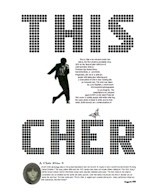 Ok so not only did I think there would be too few Cher love songs for a mix (and I ended up having to be judicious there) but I thought I’d find a plethora of philosophical songs (or even pseudo-philosophical ones) for a mix. Not only were there not that many but I soon ran into the conundrum of where does a philosophical song end and a political one begin?
Ok so not only did I think there would be too few Cher love songs for a mix (and I ended up having to be judicious there) but I thought I’d find a plethora of philosophical songs (or even pseudo-philosophical ones) for a mix. Not only were there not that many but I soon ran into the conundrum of where does a philosophical song end and a political one begin?
I finally decided to exclude overtly political songs without any self-improvement qualities or introspective quality. So no “For What It’s Worth,” “Love and Understanding,” or “Love Can Build a Bridge” or “Love One Another.” And “Perfection” got kicked out of the list because the lyric never does come out against seeking perfection, just admits "I don’t have what it takes," which is I guess the philosophy of defeatism….these are hard hairs to split. Anyway, I tried to focus on world-views and mindsets instead outward focused encouragements.
Blowin’ In the Wind: Yes, definitively and famously political but essentially a direct address to ‘my friend,’ someone who is ostensibly seeking counsel. Alternatively, some self-talk. Enough non-political, philosophical questions to apply for inclusion here. And because the song is structures as a list of questions: Socratic.
Where Do You Go: Sonny Bono’s facsimile of the above. But even more self-help-y.
Time: Not sure what the point is in this rambling bit of philosophy except to say things just are and to pay attention or you will lose time. This is probably Buddhism.
Sing C’est La Vie: Sometimes words to the wise are hard to hear, in various ways. But there it is. That’s life. Here's an article about the phrase, Albert Camus and Absurdity which makes this Camus-style existentialism.
There But For Fortune: Ah, here we go. This is the mindset of 'things could be worse,' a version of "There but for the grace of God," which was a paraphrase from the Bible so Christian.
Good Times: Although I think there is philosophy hidden all up in lines like “Irving, bubby” and “Why don’t you sing ‘em a song/Shucks ma’am I can’t sing/Don’t let that stop you” you will have to ignore some nonsensical verses until you can-can into the song’s live-it-up philosophy, one that is infectious if not alarmingly factually inaccurate. Merry-go-rounds: notorious for breaking down. But hey, “Drink to the good times and hope, my friend, that they last.” Could possibly be interpreted as Hedonism.
We All Sleep Alone: A bit of a Debbie-Downer here but at least the video message goes down with some satin-sheeted sugar. Some fans disagree with me but I think this song is about death and the alienation of the soul…in death. But it's also about Cher’s list of lovers and her philosophy about relationships before she ultimately encounters….death. Possibly Atheism.
Heart of Stone: Like "Blowin in the Wind," lots of very political lines (which are emphasized visually in the video), but essentially this song is about the self and I have decided she’s singing about Stoicism.
Love is the Groove: I wonder if the dance-bait title does the song a disservice. The ideas are a bit vague and not sure where the metaphors point. But that gives the song a koan-like quality. So there you go.
Più Che Puoi: Not that different from the philosophy of "Good Times," although delivered with much more melancholy.
Favorite Scars: Okay, more than the other songs, this feels a bit like Brené Brown and self-help. Which I guess makes it Applied Philosophy.
The Winner Takes It All: Questionable addition even to me. But there’s a cynicism to this song that feels downright Ancient Greek. “The Gods may throw a dice/their minds as cold as ice.”
Peruse the Philosophical on Spotify.
 Speaking of philosophy, I read this essay recently, "Moonstruck, or How to Ruin Everything" by William Day. It's from the book Ordinary Language Criticism: Literary Thinking after Cavell after Wittgenstein. Yes, Wittgenstein. I kid you not.
Speaking of philosophy, I read this essay recently, "Moonstruck, or How to Ruin Everything" by William Day. It's from the book Ordinary Language Criticism: Literary Thinking after Cavell after Wittgenstein. Yes, Wittgenstein. I kid you not.
Day compares the operatic elements in Moonstruck to Werner Herzog’s Fitzcarraldo. I can tell you this, I never thought I’d see the words Cher and Wittgenstein in one sentence, let alone Cher and Fitzcarraldo.
Day also compares the movie to certain romantic comedies of the 1940s with emphasis on a heroine involved in the idea of a re-marriage. This is quite an amazing essay as much about the movie’s themes as it is about the experience of reading in comparison to the experience of performance.. Day even suggests the movie’s depiction of the repression of sexual desire is actually a metaphor for lost or unrealized potential and living with abandon.


Leave a Reply